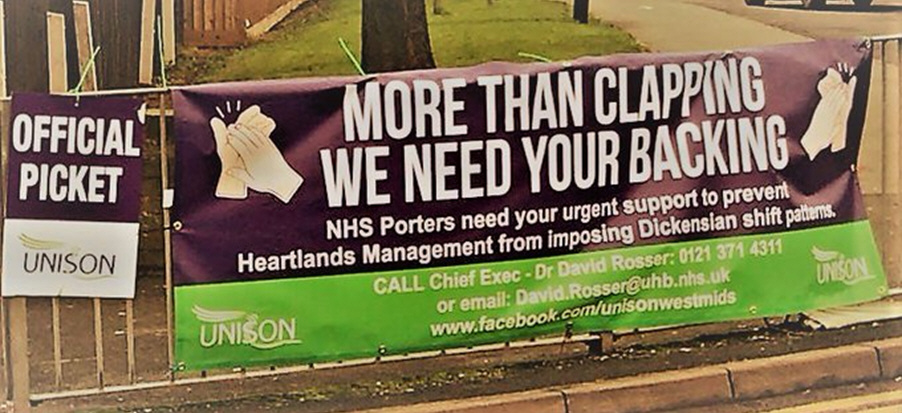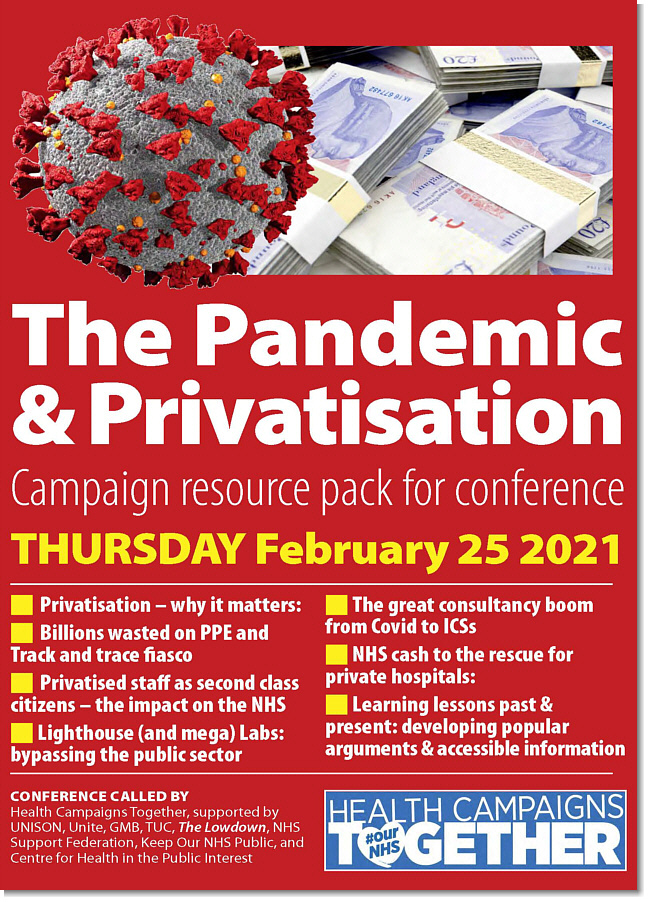 A coalition to defend #ourNHS |
|||
Recent campaigns and issuesAnalysisPFI and its aftermathArchive – fighting privatisation from the 1980s onwardsCentene/Operose |
Fighting Privatisation and ContractorsThis section to be updated early 2024 Data and Resources
Recent campaigns and issues
Frimley drops subco plan: Another one bites the dustFrom The Lowdown March 20The welcome news has leaked out that Frimley Health is not going to go ahead with any further work on setting up a Wholly Owned Subsidiary. Two years of effort by the trade unions have again paid off and staff will not be transferred out of the NHS against their will. I have worked for UNISON on more than 20 proposals for various WoCs across the country over the last 5 years. It is worth reflecting on some of the lessons. The Frimley proposals were running in parallel with those at Bradford. Both had been through the NHS Improvement process for validation and astonishingly Bradford had "passed". For Bradford this did not count for much, as after some intense round the table exchanges - ending with a face-to-face meeting with the Chief Executive and Chair - the proposal was dropped. Frimley proved harder to deal with, and the initial intransigence of management was met by a very solid ballot for industrial action. Intensive talks involving the three main trade unions then took place over several months as the unions were presented with the management case and demolished it. UNISON, Unite and the GMB worked very well as a team. Then the pandemic focused minds elsewhere and nothing progressed for a year - now it is over. There is a pattern to most of these sagas. Proposals are developed in secret with no staff involvement; proposals reach the stage of planning for implementation and discussions are offered on how to make the change not on why the change is needed. Staff are presented with limited information which is highly biased and requests for more information are brushed aside - it is all too complicated for staff representatives to comprehend. Staff are told all will be well, and claims are made that talks with staff have had a generally positive response. Additional information is offered to address fears that have been expressed and to dismiss them. But from here on it gets harder, as now the trade unions have to be involved. They do not want to discuss how things are to be done: they want talks about why they need to be done in this way. They ask for the case to be made to them. Despite quite clear guidance management routinely refuse to disclose their business case claiming commercial confidentiality - entirely bogus. When finally viewed it turns out most business cases are very poor! Details do get out: and it is almost inevitable that the management case collapses. Rarely if ever are proper options appraisals carried out - the option of working with staff representatives to address whatever the problem is; then developing and investing in the current workforce to get a consensus solution never gets a look in. If options are even evaluated at all then this is done by management teams, not those who know the work. So, the case starts to fall apart as the unions input their real world experience from other places to counter claims made by management. It turns out the trade unions know as much as management and their consultants - and often far more! There are usually two things to look out for alongside weak business cases. Too often proposals are actually being led by external management consultants. But projects led by management consultants that are full time on this venture are a problem - they are biased, as their income depends on their ideas going ahead - they really hate being challenged! And too often, these projects are led by a member of the Executive team who stands to gain an increased role or a promotion if it goes ahead - maybe being the Chief Executive of the WoC. Rarely do Boards challenge the potted version of the advantages put to them. Experience does show the value of being able to challenge the case objectively and robustly - often Board members only hear the positives from those driving projects and are amazed when the unions point out some of the issues. But campaigning helps too. In a few places there have been particularly stubborn managers leading the charge. So, negotiations are supported by the threat of industrial action, by campaigns running in local press and social media and even sometimes by actual demonstrations that pile on pressure to force negotiations to be taken seriously. Another one bites the dust: this time one of the flagships being pushed by NHS England/Improvement. Hopefully, this is the last time, as likely tax changes and an even tighter oversight of proposals - combined with the excellent record of the trade unions in opposing proposals, will kill off any other attempts. Reading security guards question contractor's profits20 security guards at Reading's Royal Berkshire NHS Foundation Trust have been taking strike action since mid-December in pursuit of a pay claim. Their third wave of strike action will run from 19.00 on Friday 12 February and ending at 19.00 on Sunday 7 March.This follows on from already announced strikes from 8 to 12 February. NHS bosses are being challenged on the profit margins of the outsourced contract. The trust is paying Kingdom Service Group Ltd a total of £755,763-a-year to provide security for the trust. The security guards are currently on strike until early March over the company's failure to make a decent 2020 pay offer. Their union, Unite, is now questioning whether the contract is 'value for money' and how big the profit margins are for Kingdom - which boasts a £100 million plus turnover. Unite argues it could be better value for the taxpayer if the contract was brought back in-house: Unite regional officer Jesika Parmar said: "There could be a very strong case for this contract being taken back in-house and the money saved being spent on patient services, rather than a profit-hungry private company, at this critical juncture in the battle against Covid-19. "We would also like to see the security guards currently on the NHS frontline properly rewarded for their dedication and hard work. This could be achieved if the Kingdom contract was jettisoned." NHS staff and general public are urged to sign the online petition supporting the security guards.  Porters fight imposition of shift changes at Heartlands HospitalPorters, members of UNISON, have been campaigning against imposition of new shift patterns, linked to a "fire and rehire" threat by the Trust Board.See page 7 of HCT News Bulletin #5 (8 February 2021) Victory against outsourcing at HinchingbrookeIn the autumn of 2020 Catering and support staff staged an impromptu protest outside Hinchingbrooke Hospital, against threatened outsourcing of their jobs by North West Anglia Foundation Trust, (formed in the merger of Hinchingbrooke Hospital Trust with Peterborough and Stamford Hospitals FT).UNISON, which with Unite fought the outsourcing plan, published a detailed response, researched by HCT editor John Lister. The report takes apart the case to outsource the award-winning catering service, drawing from the experience of three decades' failed privatisation of NHS services and the latest research showing that a sell-off would be "most unwise." It lambasts the complete lack of a business case for outsourcing and argues that at the very least the Trust should consider an in-house bid for the multimillion-pound contract. The full report can be obtained HERE SEE ALSO
InternationalPublic Services International -When the market becomes deadly - Privatisation and the Pandemic (CEO Report)This report from Corporate Europe Observatory (CEO) exposes how pressures towards privatisation of health and long-term care put Europe on a poor footing for a pandemic. Health and Social Care Workers and the Crisis of NeoliberalismLaunched on 29 October, the Global Day of Action on Care, the following report was compiled and completed in the final months of 2019, before the Covid-19 pandemic enveloped the globe. The report details the corporate frameworks and driving economic forces of international care industries. It raises grave concerns about the nature of the economic models that, long before the pandemic hit, this report shows were already badly failing the vulnerable and those in need of care, with wholesale shifts from public to private for-profit health care provision.Reclaiming Public ServicesA book-length study from the Transnational Institute for you to download: How cities and citizens are turning back privatisationEuropean Day Of Action against Commercialisation of Health Care
A second European Day of action against Health commercialisation was called for 7 April 2017. In 2016, action took place in Belgium, France and Spain, and several other activities across Europe have been shared through social media. |
Video recordings of HCT online conference
|
|
|
Copyright © 2025 Health Campaigns Together
| |||
